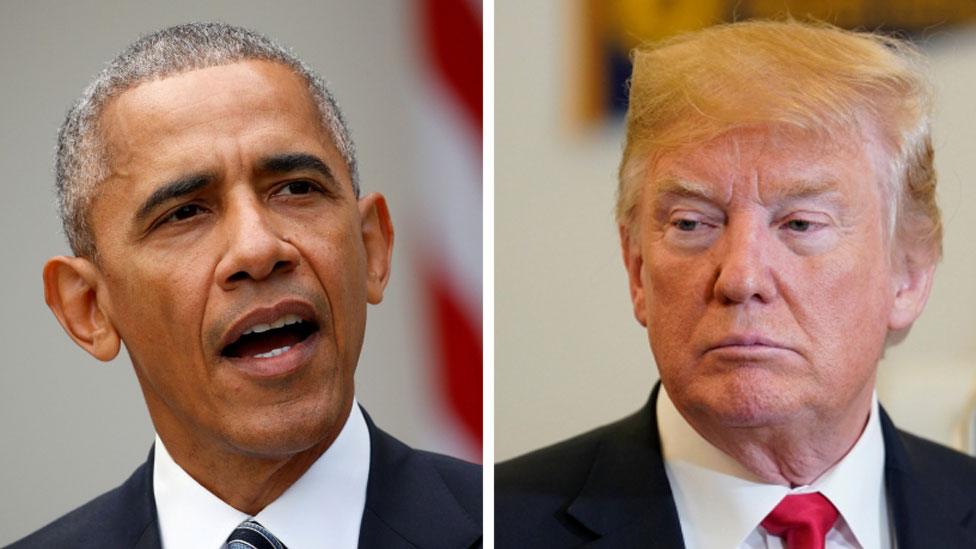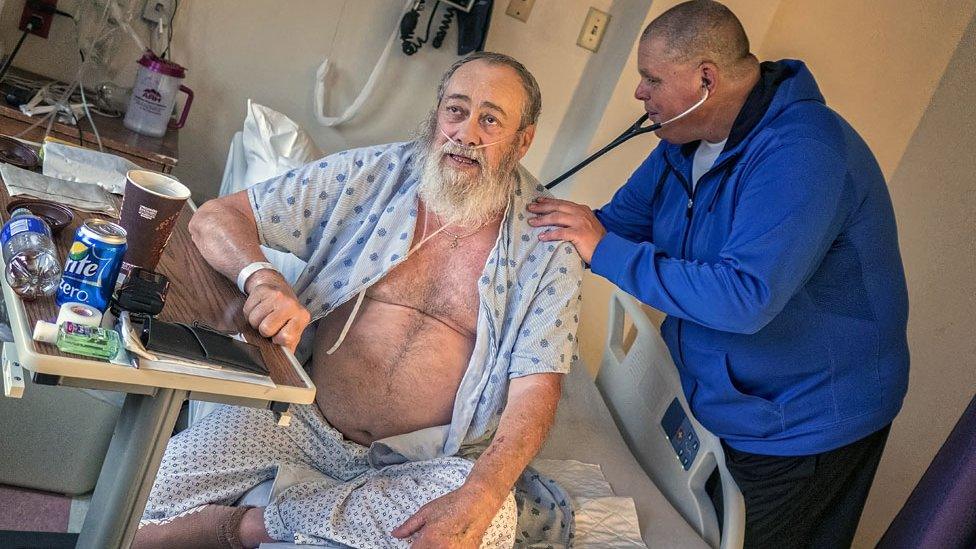Republican attempts to replace Obamacare fail
- Published
President Trump won big in Kentucky last year but the state also depends heavily on Obamacare
Republican efforts to find a replacement for President Obama's healthcare system have collapsed.
Two Republican senators said they opposed their party's proposed alternative, making it impossible for the bill to pass in its current form.
The party has been divided on the issue, with moderates concerned about the effects on the most vulnerable.
President Trump has now called for repeal of Obamacare, so Republicans can start "from a clean slate".
That task falls to Senate Majority Leader Mitch McConnell.
"Regretfully, it is now apparent that the effort to repeal and immediately replace the failure of Obamacare will not be successful," Mr McConnell said.
What had been proposed?
President Trump had made repealing and replacing Obamacare, under which more than 20 million people gained healthcare coverage, a key campaign pledge.
Republicans view the 2010 legislation as an overreach of the federal government and say patients have less choice and higher premiums.
The party's proposed alternative had kept key Obamacare taxes on the wealthy, while imposing sharp cuts to healthcare for the poor and allowing insurers to offer less coverage.
Why has it failed?
Two Republican senators, Mike Lee and Jerry Moran, said the new legislation did not go far enough in repealing Obamacare.
Mr Moran said, external "we should not put our stamp of approval on bad policy" while for Mr Lee,, external "in addition to not repealing all of the Obamacare taxes [the bill] doesn't go far enough in lowering premiums for middle class families; nor does it create enough free space from the most costly Obamacare regulations".
Healthcare battle in rural America
Two senators - Rand Paul and Susan Collins - had already opposed the bill. Mr Paul said the bill kept too much of the "ObamaCare taxes", while Ms Collins expressed concerns about cuts to Medicaid.
With the two new opponents, Republicans - who hold 52 seats - no longer have enough votes to pass the bill in the 100-member Senate.
Moderate Republicans had also said the bill would have harmed some of their vulnerable constituents.
The non-partisan Congressional Budgetary Office (CBO) found the bill would have stripped 22 million Americans of health insurance over the next decade.
On top of that, polls had shown Obamacare remained popular among Americans - a survey by the Washington Post and ABC News on Monday found more than twice as many people preferred Mr Obama's programme to the proposed alternative.

Analysis: The end of repeal-and-replace war?
By Anthony Zurcher, BBC North America reporter
In the end the death blow to the latest iteration of Obamacare repeal came from the right flank.
Mr McConnell was always going to have to walk a fine line in his effort to keep both moderates and hard-core conservatives in party on board with his healthcare reform proposal. After his first draft failed to garner sufficient support, he came out with a new version that moved farther to the right in key areas while throwing money to keep the moderates satiated.
That strategy worked in the House, where Freedom Caucus arch-conservatives and just enough moderates came around to rescue the legislation from death's doorstep.
This time the entire rickety structure came tumbling down. The Senate may very well try to vote on straight-up repeal, as the president has suggested - one with a two-year fuse - but it faces long odds in winning a majority support. If and when that fails, it's back to the drawing board for Republicans.
This isn't the end of congressional efforts to pass healthcare legislation. But it's likely the end of the repeal-and-replace war as it's been waged for the past six months.

What happens now?
Mr Trump urged, external Republicans to repeal the "failing Obamacare now and work on a new healthcare plan that will start from a clean slate".
Mr McConnell said, external he would try to pass a repeal of Obamacare with a two-year delay implementation that would provide a "stable transition period" to a new legislation.
Correspondents, however, say that this plan has little chance of passing as, under the interim period, millions would be left without healthcare.
Republican Senator John McCain, who is recovering from surgery, called for a bipartisan strategy to produce a new bill.
"The Congress must now return to regular order, hold hearings, receive input from members of both parties," he said in a statement., external
Trump's battles with Obamacare - in his own words
Democrats have said they will not co-operate to repeal Obamacare, but that they can work in a bipartisan way to improve it.
Senate Democratic Leader Charles Schumer said on Twitter, external: "This second failure of Trumpcare is proof positive that the core of this bill is unworkable."
- Published18 July 2017
- Published20 September 2017

- Published29 March 2019

- Published3 July 2017
